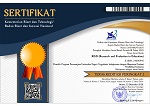Assessment and feedback practices in the EFL classroom
DOI:
https://doi.org/10.21831/reid.v7i1.37741Keywords:
assessment, feedback, practices, EFL classroomAbstract
References
Ahsan, S. (2009). Classroom assessment culture in secondary schools of Dhaka City. Teacher's World, 33–34(9), 231–244.
Black, P., & Wiliam, D. (1998). Assessment and classroom learning. Assessment in Education: Principles, Policy & Practice, 5(1), 7–74. https://doi.org/10.1080/0969595980050102
Black, P., & Wiliam, D. (2009). Developing the theory of formative assessment. Educational Assessment, Evaluation and Accountability, 21(1), 5–31. https://doi.org/10.1007/s11092-008-9068-5
Box, C., Skoog, G., & Dabbs, J. M. (2015). A case study of teacher personal practice assessment theories and complexities of implementing formative assessment. American Educational Research Journal, 52(5), 956–983. https://doi.org/10.3102/0002831215587754
Burns, C., & Myhill, D. (2004). Interactive or inactive? A consideration of the nature of interaction in whole class teaching. Cambridge Journal of Education, 34(1), 35–49. https://doi.org/10.1080/0305764042000183115
Decristan, J., Klieme, E., Kunter, M., Hochweber, J., Bí¼ttner, G., Fauth, B., Hondrich, A. L., Rieser, S., Hertel, S., & Hardy, I. (2015). Embedded formative assessment and classroom process quality: How do they interact in promoting science understanding?. American Educational Research Journal, 52(6), 1133–1159. https://doi.org/10.3102/0002831215596412
Derrick, J., & Ecclestone, K. (2006). Formative assessment in adult literacy, language and numeracy programmes: A literature review for the OECD. Centre for Learning, Teaching and Assessment Through the Lifecourse, University of Nottingham.
Dunn, K. E., & Mulvenon, S. W. (2009). A critical review of research on formative assessment: The limited scientific evidence of the impact of formative assessment in education. Practical Assessment, Research and Evaluation, 14(7), 1-11. https://doi.org/10.7275/jg4h-rb87
McMillan, J. H., Venable, J. C., & Varier, D. (2013). Studies of the effect of formative assessment on student achievement: So much more is needed. Practical Assessment, Research & Evaluation, 18(2), 1–15. https://doi.org/10.7275/tmwm-7792
Rahman, M. M. (2018). Exploring teachers practices of classroom assessment in secondary science classes in Bangladesh. Journal of Education and Learning, 7(4), 274–283. https://doi.org/10.5539/jel.v7n4p274
Stiggins, R. J. (2002). Assessment crisis: The absence of assessment for learning. Phi Delta Kappan, 83(10), 758–765. https://doi.org/10.1177/003172170208301010
Tante, A. C. (2018). Primary school teachers' classroom-based assessment feedback culture in English language. International Journal of Educational Research Review, 3(4), 32–47. https://doi.org/10.24331/ijere.425151
Taras, M. (2005). Assessment - summative and formative - some theoretical reflections. British Journal of Educational Studies, 53(4), 466–478. https://doi.org/10.1111/j.1467-8527.2005.00307.x
Widiastuti, I. A. M. S. (2018). Teachers' classroom assessment and grading practices. SHS Web of Conferences, 42(00052), 1–7. https://doi.org/10.1051/shsconf/20184200052
Widiastuti, I. A. M. S., Mukminatien, N., Prayogo, J. A., & Irawati, E. (2020). Dissonances between teachers' beliefs and practices of formative assessment in EFL classes. International Journal of Instruction, 13(1), 71–84. https://doi.org/10.29333/iji.2020.1315a
Widiastuti, I. A. M. S., & Saukah, A. (2017). Formative assessment in EFL classroom practices. Bahasa dan Seni: Jurnal Bahasa, Sastra, Seni dan Pengajarannya, 45(1), 50–63. https://doi.org/10.17977/um015v45i12017p050
Yang, C. C. R. (2010). Teacher questions in second language classrooms: An investigation of three case studies. Asian EFL Journal, 12(1), 181–201. Retrieved from https://www.asian-efl-journal.com/main-editions-new/teacher-questions-in-second-language-classrooms-an-investigation-of-three-case-studies/
Downloads
Published
How to Cite
Issue
Section
Citation Check
License
The authors submitting a manuscript to this journal agree that, if accepted for publication, copyright publishing of the submission shall be assigned to REID (Research and Evaluation in Education). However, even though the journal asks for a copyright transfer, the authors retain (or are granted back) significant scholarly rights.
The copyright transfer agreement form can be downloaded here: [REID Copyright Transfer Agreement Form]
The copyright form should be signed originally and sent to the Editorial Office through email to reid.ppsuny@uny.ac.id

REID (Research and Evaluation in Education) by http://journal.uny.ac.id/index.php/reid is licensed under a Creative Commons Attribution-ShareAlike 4.0 International License.







.png)





